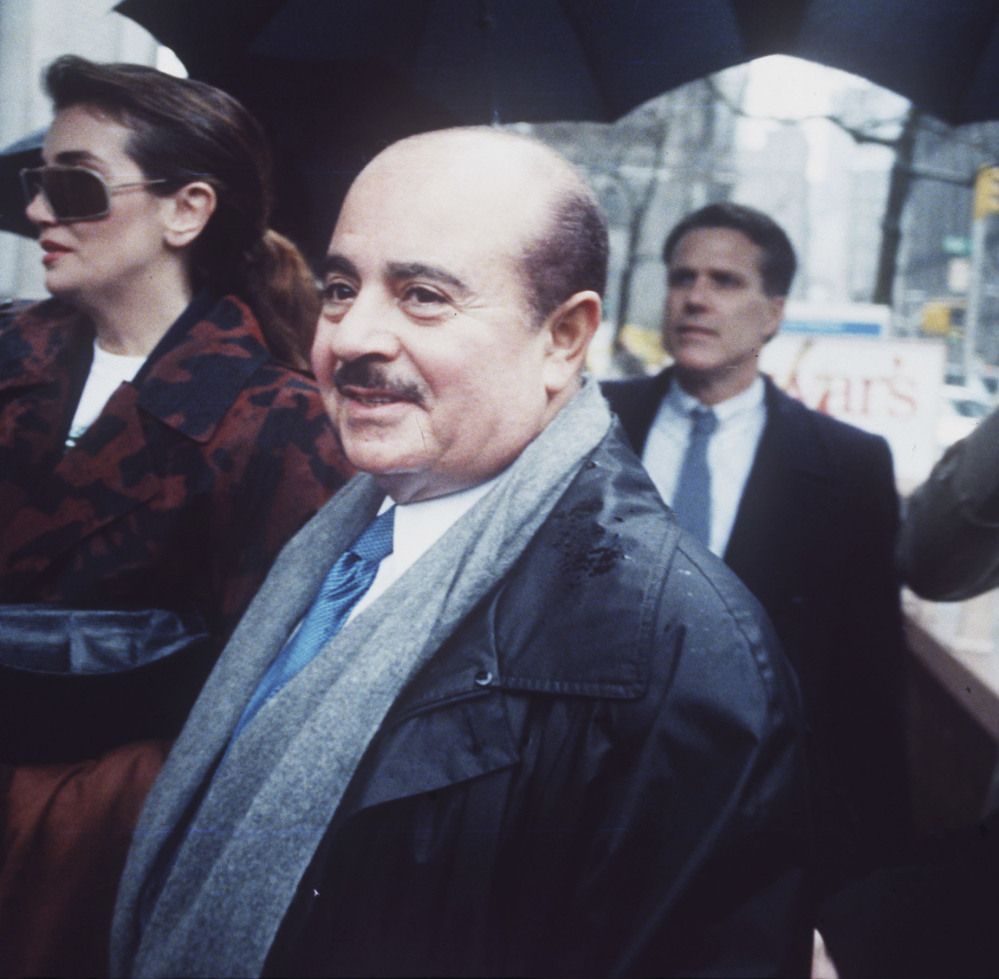Adnan Khashoggi, a Saudi middleman-for-hire who amassed huge wealth and influence peddling everything from American weapons to favors for Riyadh’s rulers and CIA spymasters, only to see his fortunes collapse amid the Iran-contra affair and other scandals, died on June 6 at a hospital in London. He was 81, by most accounts.
The cause was complications from Parkinson’s disease, the family said in a statement.
Khashoggi’s name may have lost its luster since his peak in the 1970s and 1980s, but not so the list of misdeeds and abuses that remain defining events of the time. Though never convicted, the U.S.-educated Khashoggi was linked, as a money-mover and five-star fixer, with some of the era’s most infamous figures and schemes.
At the same time, he moved seamlessly between covert shadows and dazzling opulence – a lifestyle estimated by the Economist in 1987 to cost $250,000 a day. He partied with Hollywood elite such as Cary Grant and Elizabeth Taylor; traveled in a blinged-out DC-8; kept an Indian swami as an on-call adviser; and boasted about his bevy of young mistresses.
This was grade-A fodder for tabloids and gossip magazines years before Khashoggi’s nephew Dodi al-Fayed riveted the world’s attention with his brief and tragic romance with Princess Diana.
Khashoggi’s swashbuckling career and personal indulgences were underwritten by international weapons trade – of which he took a healthy commission – and other forays well off the books: funneling weapons to Iran and elsewhere; working as a private Saudi envoy; and forging bonds with former Philippines president Ferdinand Marcos and his wife, Imelda, amid accusations that they fled the country in 1986 with looted riches.
Khashoggi, meanwhile, was building a business empire that included resorts in Kenya, shipping lines in East Asia and an office complex in Salt Lake City that was left partially built.
“There are skeletons hidden behind skeletons in the Khashoggi closet,” Theodore Karasik, a Dubai-based defense analyst specializing in Persian Gulf affairs, said in an interview. “No history of the region can be written without hearing them rattle.”
For his 50th birthday in 1985, Khashoggi threw a five-day bacchanal at his retreat in southern Spain. The cake was topped by a spun-sugar crown modeled after one worn by France’s Sun King, Louis XIV, and guests roamed the grounds with flutes of Moët champagne among imported African wildlife.
At another villa, near Cannes – one of more than a dozen homes he once owned across four continents – Khashoggi provided a haven-for-rent for the ousted Haitian ruler Jean-Claude Duvalier after he was driven from his Caribbean nation in 1986.
The mix of hedonism, power and audacity swirling about Khashoggi was so heady that the British rock band Queen wrote a song about it, “Khashoggi’s Ship,” referring to his 281-foot yacht outfitted with a laser that sketched its owner’s smiling image in the main cabin. The vessel would eventually end up with Donald Trump, who called Mr. Khashoggi “a great broker and a lousy businessman.”
Journalist Ronald Kessler, author of a 1986 book, “The Richest Man in the World: The Story of Adnan Khashoggi,” described Khashoggi as a scalpel-sharp strategist. “Even at these fantastic parties, he’s working, doing deals,” Kessler told People magazine at the time. “He’s thinking, ‘Who’s important, who might help me with this or that?’ A deal is like a big hunt for him.”
It all unraveled for Khashoggi – or A.K., as he liked to be called – in equally spectacular fashion.
He was named, along with Iran-contra point man Oliver North and others, as a key intermediary in the clandestine CIA-directed plan in the 1980s to send arms to Tehran in exchange for captives held by pro-Iranian militias in Lebanon. The Iranian money was then shifted to U.S.-backed contra rebels in Nicaragua,in violation of various codes including Congress-imposed limits on aid to the contras.
Khashoggi was never charged in the Iran-contra dealings. But his fingerprints cropped up in many other shady places.
He was accused of bankrolling some of the Iran-contra arms purchases through the Luxembourg-based Bank of Credit and Commerce International, which collapsed in 1991 amid probes into widespread money laundering. In the United States, Khashoggi was mentioned by investigators on the fringes of the contract-for-kickbacks scandal around Wedtech Corp., whose downfall also led to the resignation of prominent officials such as then-Attorney General Edwin Meese III in 1988.
The following year, Khashoggi was arrested in Switzerland on U.S. charges linked to accusations of helping the Marcos family conceal more than $200 million in cash and artworks allegedly stolen during Ferdinand Marcos’ presidency from 1965 to 1986. While awaiting extradition, Khashoggi had his jailhouse meals catered by the luxury Schweizerhof Hotel in Bern.
Khashoggi faced trial on racketeering and other charges. But he and Imelda Marcos, then a widow, were acquitted in U.S. federal court in New York in 1990. Jurors appeared swayed by contentions that Imelda Marcos knew nothing of alleged wrongdoing and that Khashoggi broke no American laws.
He then faded into a kind of gilded twilight: living comfortably in Saudi Arabia and Monaco but shunned by the executives and political bigwigs who once clamored for his let’s-make-a-deal skills.
Send questions/comments to the editors.



Success. Please wait for the page to reload. If the page does not reload within 5 seconds, please refresh the page.
Enter your email and password to access comments.
Hi, to comment on stories you must . This profile is in addition to your subscription and website login.
Already have a commenting profile? .
Invalid username/password.
Please check your email to confirm and complete your registration.
Only subscribers are eligible to post comments. Please subscribe or login first for digital access. Here’s why.
Use the form below to reset your password. When you've submitted your account email, we will send an email with a reset code.